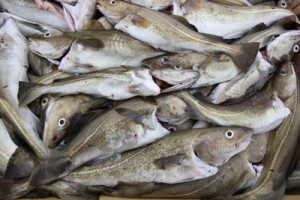Consumers “completely confused” about cod, says MSC
- Like
- Digg
- Del
- Tumblr
- VKontakte
- Buffer
- Love This
- Odnoklassniki
- Meneame
- Blogger
- Amazon
- Yahoo Mail
- Gmail
- AOL
- Newsvine
- HackerNews
- Evernote
- MySpace
- Mail.ru
- Viadeo
- Line
- Comments
- Yummly
- SMS
- Viber
- Telegram
- Subscribe
- Skype
- Facebook Messenger
- Kakao
- LiveJournal
- Yammer
- Edgar
- Fintel
- Mix
- Instapaper
- Copy Link
Posted: 7 December 2015 | Victoria White | 1 comment
Consumers are still “completely confused” about whether or not they can eat cod with a clear conscience, according to the Marine Stewardship Council (MSC)…


Consumers are still “completely confused” about whether or not they can eat cod with a clear conscience, according to the Marine Stewardship Council (MSC).


Although cod is the second most purchased fish in the UK, in a YouGov survey carried out for the MSC, more than one in three UK adults admitted that they don’t know if cod is sustainable or not, and whether people should (or should not) be eating it.
Almost three in ten of those surveyed said they think there are plentiful supplies of cod and it is a sustainable choice of fish, but the same number said they believed the opposite: that the fish is not sustainable and that people should actively avoid eating it where possible.
Commenting on the survey findings, Toby Middleton, Programme Director for MSC in the UK, said: “It’s no wonder that a lot of people are completely confused about cod. Over the last decade, campaigners have been telling people to avoid eating cod from the North Sea, and other places where it’s been overfished. That has stuck in people’s minds, but it doesn’t mean you need to avoid all cod – it can be sourced sustainably from Icelandic or Norwegian waters, for example.”
North Sea cod could be making a comeback soon
Recent research suggests that North Sea cod could also be making a comeback in the near future, after several years of being ‘off the menu’ for ethical eaters. It was overfished during the 1980s and 1990s, but strict catch controls were imposed in 2006 and since then fish numbers have recovered considerably thanks to a concerted effort by the fishing industry.
Last month, a Danish fishery started an assessment for MSC certification for its North Sea fish and Scottish fisheries have also expressed an interest in achieving MSC certification for their North Sea catch. If the MSC’s assessment process finds the fish population is sustainable, North Sea cod could be back on menus soon. “All being well, MSC certified North Sea cod landed on British shores could be back in British shopping baskets within a couple of years,” adds Middleton.





EU fisheries are all nowadays well regulated monitored and enforced. Strict controls on largest EU Cod stock in N Sea have brought about significant biomass and recruitment increases as fishing pressure has tumbled. Any EU Cod in the shops has been caught under those strict rules. Consumers should buy and eat it with confidence. Maximum Sustainable Yield is the goal for all EU fisheries and many more stocks have reached that criterion already. Consumers must trust the decision makers and buy what’s on sale with confidence.
Obviously, don’t buy from the dodgy dealer down the pub who maybe has “cheap” fresh fish for sale. It might well be from an unregulated source!